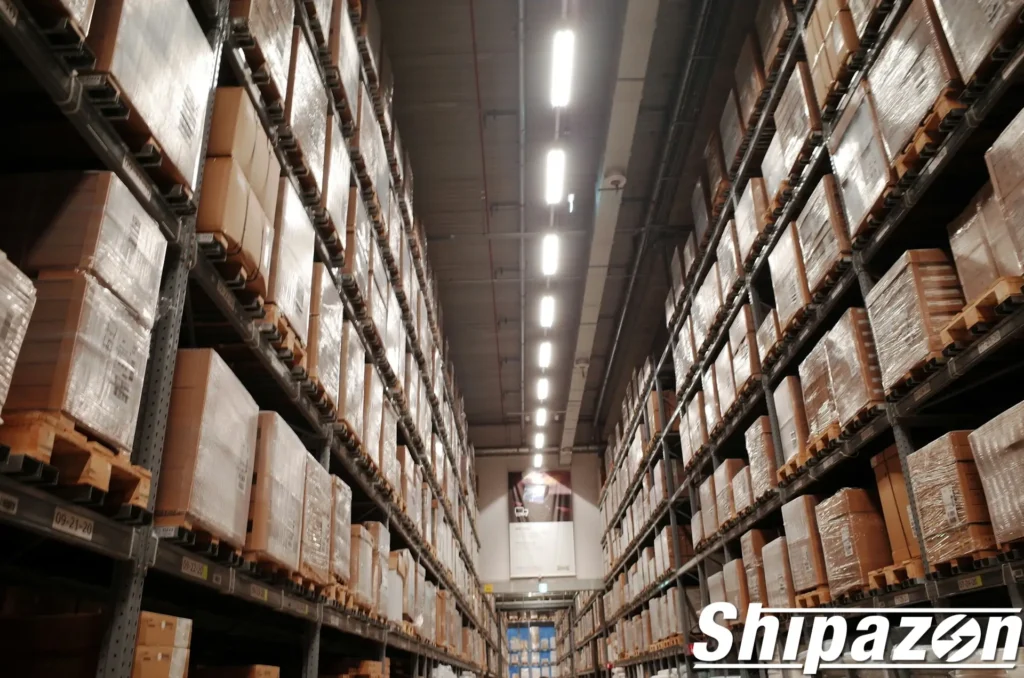Digital commerce shows no sign of slowing down in our increasingly digital world. One of the key components that will determine your success as an online business is the process of order fulfillment through a warehouse. Ecommerce warehouse fulfillment is the crucial step of making sure products are delivered to customers quickly, accurately, and safely. Let’s find out more.
Ecommerce warehouse fulfillment is the step of storing, controlling inventory, packing, and shipping products to customers from the warehouse in an e-commerce enterprise. More simply, a fulfillment warehousing operation is a place to physically store your products until they are shipped out to buyers.
Fulfillment services like this are commonly run by a third-party logistics provider (3PL) which oversees the entire logistics operation of receiving goods, storing, picking, packing, shipping, and handling returns.
By utilizing fulfillment services, e-commerce businesses can not only cut operational costs but also speed up shipping and improve customer satisfaction.
Fulfillment warehouses in the e-commerce space are typically strategically situated to further consumers’ interests by lessening shipping costs and lessening delivery time. This enables businesses to reach larger markets and operate ever more efficiently.
As well, operating a fulfillment warehouse allows e-commerce business owners to exercise better control over unexpected surges in orders, in addition to enabling them to scale their businesses more freely without the burden of managing their own storage and shipping facilities.
In short, this service is the backbone of online business logistics, ensuring products reach customers quickly, accurately, and in the best condition. This is achieved through professional warehouse management and order fulfillment processes.
Contents
The Importance of Warehouse Fulfillment for Ecommerce Businesses
Warehouse fulfillment is at the heart of the e-commerce ecosystem, by making sure customer order assignments are completed and customers are shipped their products quickly and timely. A sufficient organized system will process order assignments immediately upon ordering, ensuring customers will receive their products as expected.
Fast turnaround and timely delivery is a significant contributor to e-commerce customer satisfaction. A properly working fulfillment warehouse helps better the chances that the product will be in good condition when customers receive it while getting it to customers on time, which also improves business loyalty and reputation.
Using fulfillment services to ensure faster turnaround means that e-commerce businesses can delegate processing product storage, packaging or shipping, and reduce the time and effort to process orders, while also eliminating the level of operational stress related to product storage and shipping. Thus, sellers are free to focus on the development of the products and marketing strategies.
Also, this type of service plan allows businesses to have more control over managing their inventory by adjusting both storage and packing capability relative to ordered product quantities. This is highly useful to ensure operational costs stay within a budget, while still supporting projected business growth.
More importantly, a modern warehouse management system is able to provide businesses with a transparent view of their inventory by having virtual and real time access to the service capabilities of their services supplier in one overall system. This will reduce the chance of product stockouts and avoid potential costs associated with stock overages.
Challenges in Ecommerce Warehouse Fulfillment
E-commerce warehouse fulfillment experiences several complicated, interdependent issues. These need to be effectively addressed to guarantee an orderly and efficient order fulfillment process. One major issue relates to inventory balance. Not overstocking or understocking is important when managing inventory.
Overstocking & Understocking
Overstocking leads to inventory holding costs and risks product obsolescence or product expiry. On the other hand, selling out of stock means losing out on potential sales as well as consumers potentially being upset due to the out of stock situation.
WMS
Also, technology integration and automation are one important element to increase the speed and accurate processing of orders. Being able to utilize a warehouse management system (WMS) and other automated processes can help in speeding up workflows in the warehouse.
However, in most cases, implementing new technology is a bit challenging for most retailers, especially if they are transitioning from traditional retail to an e-commerce retail model. Introducing new technology into business practices requires planning, costs, training, and making changes to processes, which are not easy to implement immediately.
Operational Costs
Another notable issue involves operational costs. Material costs, packaging, transportation, and warehouse operations itself can tend to increase at alarming rates and drastically impact business profit margins. Any changes in these costs must be anticipated with sufficient planning to minimize negative impact on maintaining continuity of business operations.
Variable Order Volumes
Variable order volumes can also complicate ecommerce fulfillment. Surge orders during critical times and maximum promotional periods can upset companies and staff. When these pressures are not managed appropriately, it can lead to delivery exceptions and service issues, which can ultimately harm customer satisfaction.
Speed and accuracy are the keys to customer satisfaction and shopping experience, but this is a huge undertaking when you are managing logistics with multiple shipping providers and managing all the different delivery routes. The organization and management of orders and timing ensured to every package arrives on consumers’ doorsteps, intact and on time.
Demand Planning
And lastly, demand planning is paramount due to the overall ecommerce fulfillment process. Having a proper understanding of customer needs is vital so that shortages or overages do not happen. If planning and continuity are not maintained it will cease fulfillment operations due to lack of inventory on a product or surplus inventory on another.
Final Note
Fortunately, Shipazon is a warehousing and fulfillment company that can truly become a resource for ecommerce warehouse fulfillment. We provide warehouse locations, fulfillment services, warehouse technology for complete inventory management, and e-commerce flexibility and scalability. Shipazon helps companies manage their order fulfillment, expedite deliveries, and ultimately create overall customer satisfaction.
“Reliable and efficient ecommerce warehouse fulfillment isn’t just about moving boxes; it’s about creating a seamless experience that strengthens customer trust and drives growth.”
— Andre Ren, Co-Founder & Logistics Manager at Shipazon


